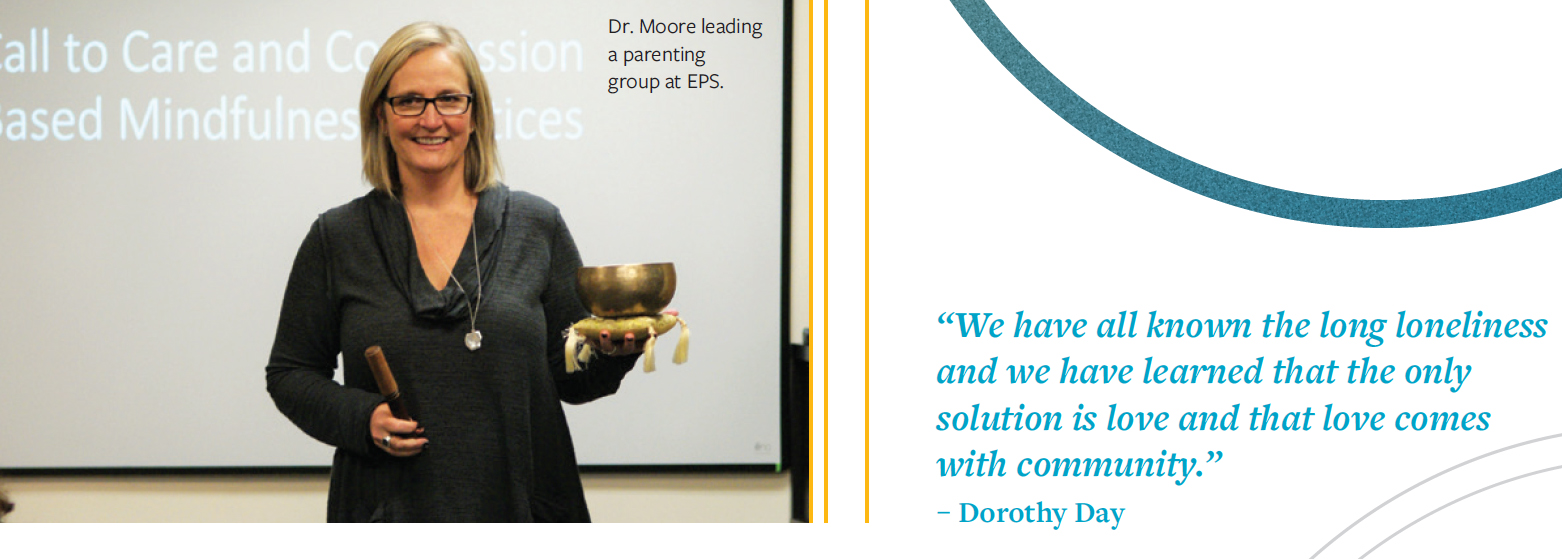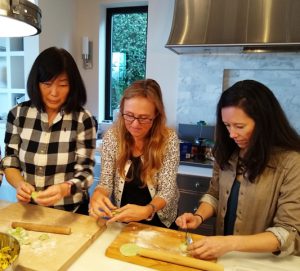
Building an Intentional Parent Community
By Dr. Kelly Moore, Parent Educator and Consultant
SINCE THE INCEPTION OF EASTSIDE PREP, DR. TERRY Macaluso has been focused with the concept of culture. She has (rightly in my opinion) argued that the culture of a place is what gives it meaning, direction, and ultimately, success. Mission, vision, and value statements are important but only as they are lived in the culture and seen as guideposts and reflections of the “way we do things here.” Key to successful cultures in any organization, but particularly in schools, is how we “do community.” We know that we are wired to be in community—we simply can’t go it alone and survive. We all do best when we feel like we belong, have a voice, and others have our backs if we run into trouble. In fact, according to Jim Coan at the University of Virginia (Coan and Maresh, 2014), the stronger our community, the more confident we feel to accomplish difficult tasks. His Social Baseline Theory argues that the brain’s baseline is to be in relationship and when it isn’t or when that is threatened, we have to use all sorts of cognitive resources to secure that belonging, thus every task we do on top of that seems more difficult. He cites studies that show pain being mediated by holding a loved one’s hand, the perception of the weight of a backpack being lighter when accompanied by friends, and the incline of a hill seeming less steep when social networks are present.
We don’t need research, however, to tell us how much we need each other and how much belonging matters. Think about the last time your child came home feeling left out or you were excluded from something. How much else could you think about? How difficult did life seem from inside that rejection? What is true, however, is that no matter how wired we are for community and belonging and no matter how much science directs us to the imperative of it, we live in a culture that doesn’t give time to it. We are fed the idea that if we are struggling, it is because we have done something wrong. Further, we are so darn busy “getting things done” that relationship and community get put on the back burner. In my twenty-five years of working with adolescents and parents, I have learned many things but the one that continues to break my heart is how alone most parents feel when raising their teenagers. We are no longer the center of our children’s lives and much of what they do goes on outside our purview. Yet, we are still responsible for them and their wellbeing. For better or worse, our culture also measures our success as a parent on our child’s achievements: what college they attend, what grades they earn, and what jobs they get. When our child is in trouble or struggling in a class, the cultural norm is to keep that to ourselves and figure it out on our own. Half of my job working with parents individually was helping reduce the shame they feel that their child is going through a normal adolescent hurdle.

Members of Dr. Moore’s class gathered during break to learn how to make dumplings. In doing so, they further built community and shared in a cultural tradition.
At EPS we know the importance of community—we work hard on making sure our student and faculty community is cohesive, that we know each other well, and that we like to work together. We also believe that community extends to our parents. We see how important it is for us all to be in this process of “growing an adult” together. We know how crucial it is that students and parents experience a sense of belonging to this community. We talk about the need for parents, many of whom do not live near extended family, to have a tribe of other parents to rely on—some who have already been through this and others who are about to embark on the journey. Our society has lost this sense of communal learning, of relying on the wisdom of others and learning together. Learning how to parent is often relegated to a book you should read (have you seen how many parenting books there are these days?) or to something you do in private in a therapist’s office. In either case, it is seen as an individual endeavor and not something we would “air in public” or “bother others with.” As a species, we have a long history of raising family in community—or at least extended family—and of sharing the burden of this daunting task with others. Doing it alone is simply too hard.
At EPS, we see the great need for parents to feel seen, heard, and supported in raising teenagers. We know that to partner with you in the wellbeing of your child serves not only you better, but our whole community. To that end, we have put the time and energy into building an intentional parent education program. To be honest, calling it “parent education” is a misnomer. In reality, it is never our goal to teach one way of being a parent. Rather it is a forum to normalize the vicissitudes of the teenage years, share tips on how to help kids open up to us, come together as a community to address mental health issues like anxiety and depression, to look at the implications of gender norms on our kids, and to put in practical language what “authoritarian parenting” even means. Mostly however, we share real stories about our struggles and, in so doing, we feel less alone and less to blame for the challenges we face at home. One additional perk to our programs is that we get to know each other as more than our child’s mom or dad. In fact, we have begun to make it a practice that we don’t introduce ourselves by our children anymore—lest we believe this is the only identity worth noting.
The parenting program has taken different shapes over the years but how it looks these days is that we hold three different all-school talks—each one of those talks is offered in both the morning and the evening to make it easier for all parents to attend. In addition, we have started meeting in smaller cohorts that stay together over time to go deeper into learning and explore at a more intimate level what supports us and what holds us back. Over time, we hope to offer more of these smaller cohort groups so that everyone who wants to can benefit from deep learning together. Meanwhile we remain focused on cultivating a vibrant parent community through many forums. EPS parents are invited to attend Parent Association gatherings, social events, and grade-level coffees. A new format for the Middle School grade-level coffees has recently been launched. This format (with parents meeting in smaller groups) allows parents to share their experiences and ideas, provide feedback, and get to know each other better.
Far from wanting to be another cog in the “am I a good enough parent” wheel, the parent education program at EPS is hoping for something much larger. We hope to create the culture we truly want for our children, rather than defaulting to a culture of competition and stress that may or may not be serving our children and our families. We also hope to reclaim community as a source of healing, strength, and resilience for our families. We know in a deep way that when we partner together, when we feel seen, heard, and supported, all of our children benefit.
James A. Coan and Erin L. Maresh (2014).
Social Baseline Theory and the Social Regulation of Emotion.
https://new.evolution-institute.org/wp-content/uploads/2017/05/Coan-Maresh-2014.pdf

